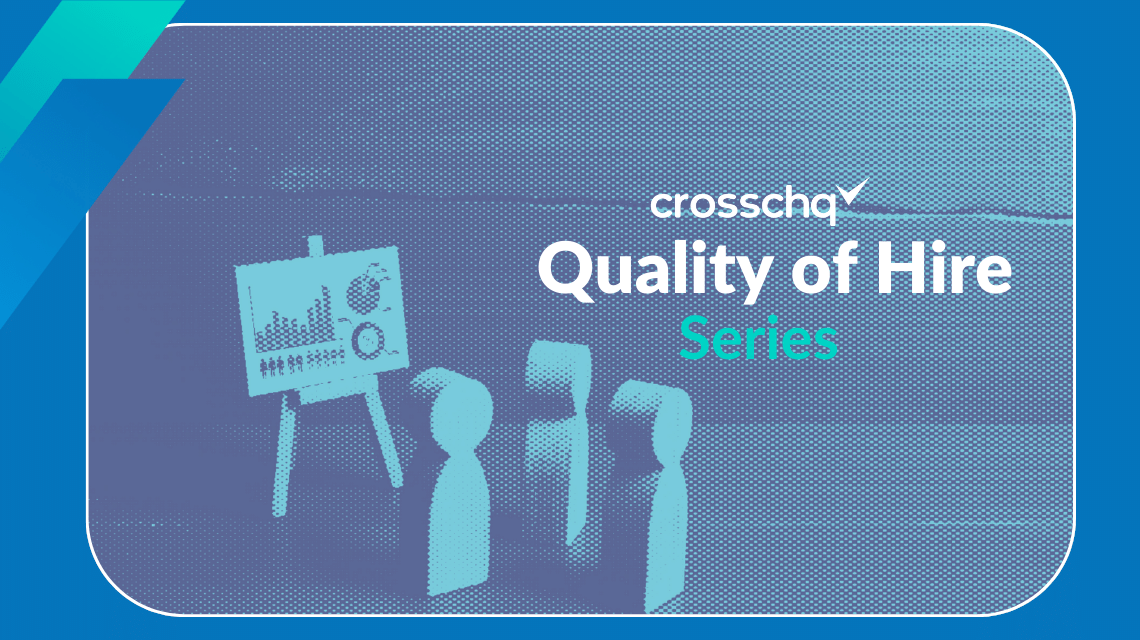

Crosschq Blog
Soft Skills Assessment

Performing the technical skills associated with a role will only get you so far in a dynamic and team-oriented position that requires strong communication, emotional intelligence, and decision-making skills.
That’s where soft skills come in.
Nearly 90 percent of recruiters said that when a new hire doesn’t work out for a company, it’s usually a result of a lack of soft skills. The best way to test for soft skills is to integrate a set of assessments, which can gauge candidates' soft skills and help you find the best quality hires.
What Is a Soft Skills Assessment
Soft skills assessments are a combination of assessment tests, 360 reference checks, self-assessments, and interviews that help you determine the soft skill competencies of a candidate.
Soft skills include interpersonal skills, communication style, problem-solving, leadership skills, social skills, emotional intelligence, listening skills, and more. Soft skill assessment tests will tell you how well candidates communicate, how emotionally aware they are of themselves and those around them, how they work under pressure, and a variety of other skills needed for most team-oriented roles.
How to use soft skills assessments
There are a few ways to leverage soft skills assessments in your hiring process. Before you integrate your test or assessment, follow these steps to ensure you have a well-devised strategy for assessing your candidates:
- Leverage pre-employment tests, including soft skill assessments, 360 reference checks, interviews, and other screening practices.
- Allow candidates to rank and self-assess their own soft skills to compare with their other results–this is a great way to gauge the self-awareness of your candidate, which is in itself an essential soft skill.
- Ask them how they would navigate difficult scenarios and conflicts that require soft skills to manage.
- Utilize quality-of-hire analytics to measure new-hire performance, which will allow you to make connections between soft skill assessment scores and new-hire performance.
Why you should use a soft skills assessment
When a bad hire leads to losses of at least 30 percent of a first-year salary, you have to ensure you’re attracting and screening for the highest quality candidates. While soft skills won’t provide you with everything you need to know about a candidate, they’re one of the most important skills to improve your quality of hire.
Here are a few key soft skill findings according to a BlinkistMagazine review with studies from the Harvard Business Review, LinkedIn Global Talent Trends Report, Stanford Research Center, and others:
- At least 85% of career success comes from soft skills and personality skills
- 92% of talent professionals believe soft skills are much more important than hard skills
- As AI and automation continue to disrupt and impact the way we work, soft skills will accordingly become more valuable
- Only 28% of spending on skill growth is being spent on soft skills (72% is being spent on hard skills)
What to Test for in Your Soft Skills Assessment
Soft skill assessments refer to a range of tests and evaluations that can provide key insights on the personality type, emotional intelligence, interpersonal skills, and leadership qualities of a candidate.
Here are a few things you can test for in your soft skills assessment:
- EQ
- Work ethic
- Communication skills
- Interpersonal skills
- Personality Type
- Problem-solving skills
- Leadership qualities
- Teamwork
- People skills
- Empathy
- Self-awareness
Soft Skills Assessment Example Template Questions
You can test for a variety of skills with the following test template structures.
Soft skills questions
|
Questions |
Strongly agree |
Agree |
Neutral |
Disagree |
Strongly disagree |
|
I tend to defend myself when criticized |
|||||
|
I will not ask for help, even if I’m backed up on my deadlines. |
|||||
|
I tend to ignore difficult conversations. |
|||||
|
I tend to move on quickly from setbacks. |
|||||
|
I try to see things from others’ perspectives, even if I know they’re wrong. |
Short Answer Responses
- What’s your ideal work environment? (culture fit)
- If you have several tasks on your to-do- list, how do you prioritize or manage your deadlines? (organization and self-awareness)
- How would you explain a new concept to an employee who’s having a hard time understanding something? (communication and interpersonal skills)
- What’s your leadership style and approach? (leadership and self-awareness)
- If you’re leading a team, how would you deal with an employee who disagrees with you? (leadership and communication)
- Describe a difficult moment with a team member and how you overcame it. (soft skills and communication)
- How would you deal with a co-worker or employee who has made a mistake? (leadership and communication)
- What are some of your biggest achievements and accomplishments? (experience)
Crosschq allows you to leverage premade tests/templates or customize your own soft skill assessments. On top of that, you’ll be able to analyze your results over time to identify key insights between assessment scores and new-hire performance.
Final Thoughts: Soft Skills Assessment Test
With Crosschq 360, you can aggregate data on key candidate quality indicators and soft skill competencies that lead to the best hires. Our machine-learning models make it easy for you to identify the most important competencies and identify which candidates have the best chance of excelling in a role.
Sign up for a demo to learn more about how Crosschq’s performance-based learning systems can help you hire for soft skills with more confidence than ever.
Take the Guesswork
Out of Hiring
Schedule a demo now



%20-200x43.png)





